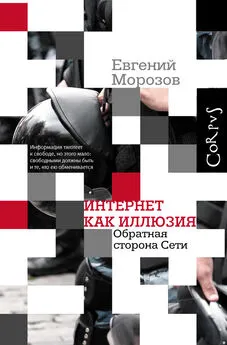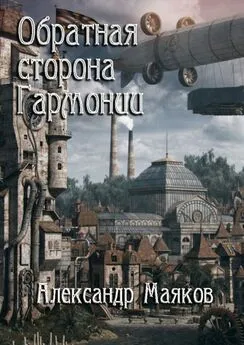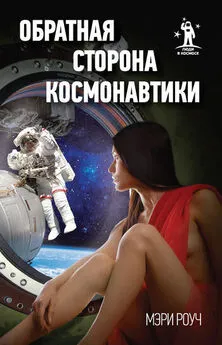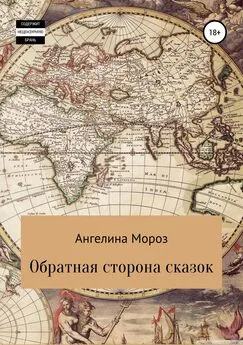Евгений Морозов - Интернет как иллюзия. Обратная сторона сети
- Название:Интернет как иллюзия. Обратная сторона сети
- Автор:
- Жанр:
- Издательство:Array Литагент «Corpus»
- Год:2014
- Город:Москва
- ISBN:978-5-17-084792-1
- Рейтинг:
- Избранное:Добавить в избранное
-
Отзывы:
-
Ваша оценка:
Евгений Морозов - Интернет как иллюзия. Обратная сторона сети краткое содержание
Интернет как иллюзия. Обратная сторона сети - читать онлайн бесплатно полную версию (весь текст целиком)
Интервал:
Закладка:
Curtin, M. Beyond the Vast Wasteland: The Policy Discourse of Global Television and the Politics of American Empire // Journal of Broad-casting & Electronic Media 37, no. 2 (1993): 127–145.
Dahlberg, L. Democracy via Cyberspace: Mapping the Rhetorics and Practices of Three Prominent Camps // New Media & Society 3, no. 2 (2001): 157.
Damm, J. The Internet and the Fragmentation of Chinese Society // Critical Asian Studies 39, no. 2 (2007): 273–294.
Deibert, R. J., and R. Rohozinski Risking Security: Policies and Paradoxes of Cyberspace Security // International Political Socio-logy 4, no. 1 (2010): 15–32.
Dobson, William J. Computer Programmer Takes On the World’s Despots // Newsweek, August 6, 2010.
El-Khairy, O. “Freedom’s a Lifestyle Choice”: US Cultural Diploma-cy, Empire’s Soundtrack, and Middle Eastern “Youth” in our Con-
temporary Global Infowar // Middle East Journal of Culture and Communication 2, no. 1 (2009): 115–135.
Elmusa, S. S. Faust Without the Devil? The Interplay of Technology and Culture in Saudi Arabia // Middle East Journal 51, no. 3 (1997): 345–357.
Facebook Deletes Hong Kong Groups That Oppose Pro-Beijing Party //
BBC Monitoring International Reports, February 5, 2010. Falvey, Christian Minister’s Web Monitoring Tool Off to Rocky
Start // Radio Prague, February 12, 2010.
Fandy, M. Information Technology, Trust, and Social Change in the Arab World // Middle East Journal (2000): 378–394.
Fletcher, Owen Apple Censors Dalai Lama iPhone Apps in China // IDG News Service, December 30, 2009.
Fox, J. The Uncertain Relationship Between Transparency and Account-ability // Development in Practice 17, no. 4 (2007): 663–671.
Franzese, P. W. Sovereignty in Cyberspace: Can It Exist? // Air Force Law Review 64 (2009): 1.
Fuchs, C. Some Reflections on Manuel Castells’ Book “Communication Power” // Triple C: Cognition, Communication, Co-operation 7, no. 1 (2009): 94.
Garnham, N. The Mass Media, Cultural Identity, and the Public
Sphere in the Modern World // Public Culture 5, no. 2 (1993): 251. Gilboa, E. The CNN Effect: The Search for a Communication Theory of International Relations // Political Communication 22, no. 1 (2005): 27–44.
Gilboa, E. Global Communication and Foreign Policy // Journal of Communication 52, no. 4 (2002): 731–748.
Glassman, James K., and Michael Doran How to Help
Iran’s Green Revolution // Wall Street Journal, January 21, 2010. Glenny, Misha BlackBerry is but a Skirmish in the Battle for the
Web // Financial Times, August 6, 2010.
Goldsmith, J. L., and T. Wu Digital Borders // Legal Affairs (2006): 40.
Goldsmith, J. L., and T. Wu Who Controls the Internet: Illu-sions of a Borderless World . New York: Oxford University Press, 2006.
Gunaratne, S. A. De-Westernizing Communication/Social Science Research: Opportunities and Limitations // Media, Culture & Soci-ety 32, no. 3 (2010): 473.
Guynn, J. Twitter Hires Obama Administration’s Katie Stanton // Los Angeles Times, July 10, 2010.
Hardy, M. In-Q-Tel, Google Invest in Recorded Future // Government Computer News, July 29, 2010. gcn.com/articles/2010/ 07/29/inqtel-google-fund-web-analysis-firm.aspx.
Hawkins, V. The Other Side of the CNN Factor: The Media and Con-flict // Journalism Studies 3, no. 2 (2002): 225–240.
Himma, K. E. Hacking as Politically Motivated Digital Civil Disobedience: Is Hacktivism Morally Justified? // Internet Security: Hacking, Counterhacking, and Society (2007): 73.
Hindman, M. The Myth of Digital Democracy . Princeton, NJ: Princeton University Press, 2009.
Hofmann, J. The Libertarian Origins of Cybercrime: Unintended Side-Effects of a Political Utopia // ESRC Research Centre Discus-sion Paper no. 62, 2010. w.lse.ac.uk/collections/CARR/pdf/DPs/ Disspaper62.pdf.
Holmes, A. Defining Transparency // Nextgov, September 3, 2009. www.nextgov.com/nextgov/ng_20090903_7217.php.
Holmes, A. The Risks of Open Government // Nextgov, September 14, 2009. www.nextgov.com /nextgov/ng_ 20090914 _ 3118 .php .
Howe, J. P. Obama and Crowdsourcing: A Failed Relationship? // Wired Epicenter Blog, April 1, 2009. www.wired.com/epicenter/ 2009/04/obama-and-crowd/.
Ibahrine, M. Mobile Communication and Sociopolitical Change in the Arab World // Quaderns de la Mediterránia 11 (2009): 51–60.
Interview with Indira Lakshmanan of Bloomberg TV . U. S. Department of State, March 19, 2010.
Issa, A. Palestine: Twitter Accused of Silencing Gaza Tribute // Global Voices, December 29, 2009. globalvoicesonline.org/2009/12/29/ palestine-twitter-accused-of-silencing-gaza-tribute/.
Jaeger, P. T., Lin, J., Grimes, J. M., and S. N. Simmons Where Is the Cloud? Geography, Economics, Environment, and Jurisdiction in Cloud Computing // First Monday 14, no. 5 (2009).
Jakobsen, P. V. Focus on the CNN Effect Misses the Point: The Real Media Impact on Conflict Management Is Invisible and Indirect // Journal of Peace Research 37, no. 2 (2000): 131.
Jenkins, H. The Chinese Columbine // Technology Review, August 2, 2002. www.technologyreview.com/read_article.aspx?id=12913&ch= infotech.
Johnson, D. G. Is the Global Information Infrastructure a Demo-cratic Technology? // Readings in Cyberethics 18 (2004): 121. Katz, J. E., and C. H. Lai News Blogging in Cross-Cultural Con-texts: A Report on the Struggle for Voice // Knowledge, Technology & Policy 22, no. 2 (2009): 95–107.
Kenner, D. Useless Democracy Promotion Efforts? There’s an App for That // FP Passport, Foreign Policy, December 31, 2009. blog. foreignpolicy.com/posts/2009/12/31/useless_democracy_promotion_efforts_theres_an_app_for_that.
Khouri, R. G. When Arabs Tweet // International Herald Tribune, July 22, 2010.
Kingsbury, P., and J. P. Jones III Walter Benjamin’s Diony-sian Adventures on Google Earth // Geoforum 40, no. 4 (2009): 502–513.
Kirkpatrick, M. Jordan Says It Will Begin Censoring Websites // Read-WriteWeb, January 14, 2010. www.readwriteweb.com/ archives/jordan_to_censor_websites.php.
Klang, M. Civil Disobedience Online // Journal of Information, Communication & Ethics in Society 2, no. 2 (2008): 2.
Kleine D., and T. Unwin Technological Revolution, Evolution and New Dependencies: What’s New About ict 4 d? // Third World Quarterly 30, no. 5 (2009): 1045–1067.
Kleinz, T., and C. Morris Higher Regional Court Says Online Demonstration Is Not Force // Heise Online, June 2, 2006. www. heise.de/english/newsticker/news/73827.
Kluver, R. US and Chinese Policy Expectations of the Internet // China Information 19, no. 2 (2005): 299.
Kluver, R., and P. H. Cheong Technological Modernization, the Internet, and Religion in Singapore // Journal of Computer-Medi-ated Communication 12, no. 3 (2007): 1122–1142.
Lagerkvist, J. Global Media for Global Citizenship in India and China // Peace Review 21, no. 3 (2009): 367–375.
Land, M. B. Peer Producing Human Rights // Alberta Law Review 46, no. 4 (2009).
Landler, Mark U. S. Hopes Exports Will Help Open Closed Socie-ties // New York Times, March 7, 2010.
Lee, Tae-hoon Lawmaker Calls for Stricter Access to NK Sites // Korea Times, October 6, 2009.
Lessig, L. Against Transparency // New Republic 9 (2010).
Lewis, J. Sovereignty and the Role of Government in Cyberspace //
The Brown Journal of World Affairs 16, no. 2 (2010). Lichtenstein, J. Digital Diplomacy // New York Times Magazine,
July 16, 2010.
Loftus, M. People Use Social Networking to Fight Violence, Extre-mism . U. S. Department of Defense, December 2, 2008.
Lonkila, M., and B. Gladarev Social Networks and Cellphone Use in Russia: Local Consequences of Global Communication Tech-nology // New Media & Society 10, no. 2 (2008): 273.
Luhr, N. L. Iran, Social Media, and US Trade Sanctions: The First Amendment Implications of US Foreign Policy // First Amendment Law Review 8 (2010): 500–533.
Lynch, M. Blogging the New Arab Public // Arab Media & Society 1, no. 1 (2007).
Lynch, M. The Internet Freedom Agenda // Abu Aardvark’s Middle East Blog, January 22, 2010. lynch.foreignpolicy.com/posts/2010/01/ 22/the_internet_freedom_agenda.
MacKinnon, R. China’s Censorship 2.0 : How companies censor blog-gers // First Monday 14, no. 2–2 (2009).
MacKinnon, R. The Great Chinese Censorship Hoax // RCon-versation, March 14, 2006. rconversation.blogs.com/rconversation/2006/03/the_great_chine.html.
MacKinnon, R. Liberty or Safety? Both – or Neither // IEEE Spec-trum, May 2010. spectrum.ieee.org/telecom/internet/liberty-or-safety-bothor-neither.
Markoff, J. U. S. and Russian Accord on Display at Internet Meeting // New York Times, April 15, 2010.
Marosi, R. UC San Diego Professor Who Studies Disobedience Gains
Followers – and Investigators // Los Angeles Times, May 7, 2010. Martin, K. E. Internet Technologies in China: Insights on the Morally
Important Influence of Managers // Journal of Business Ethics 83, no. 3 (2008): 489–501.
McCarthy, C. Philly Targets Facebook, Twitter After Snowball Fight Turns Ugly // CNET, February 17, 2010. news.cnet.com/8301-13577_3-10455254-36.html.
McConnell, M. Mike McConnell on How to Win the Cyber-War We’re Losing // Washington Post, February 28, 2010.
McMillan, R. Citing Cybercrime, FBI Director Doesn’t Bank On-line // IDG News Service, October 7, 2009.
Mearsheimer, J. J. The Tragedy of Great Power Politics . New York: W. W. Norton, 2003.
Merelman, R. M. Technological Cultures and Liberal Democracy in the United States // Science, Technology & Human Values 25, no. 2 (2000): 167.
Metzl, J. F. Information Intervention: When Switching Channels Isn’t Enough // Foreign Affairs 76, no. 6 (1997): 15–20.
Metzl, J. F. Rwandan Genocide and the International Law of Ra-dio Jamming // American Journal of International Law 91, no. 4 (1997): 628–651.
Miller, J. Soft Power and State – Firm Diplomacy: Congress and IT Corporate Activity in China // International Studies Perspectives 10, no. 3 (2009): 285–302.
Mite, V. Estonia: Attacks Seen as First Case of “Cyberwar” // Radio Free Europe/Radio Liberty, May 30, 2007.
Morozov, E. More on the Unintended Consequences of DDoS Attacks on Pro-Ahmadinejad Web-sites // Net Effect, Foreign Policy, June 18, 2009. neteffect.foreignpolicy.com/posts/2009/06/18/more_on_the_ unintended_consequences_of_ddos_attacks_on_pro_ahmadine-jad_web_sites.
Morozov, E. U. S. Web Firms Practice Self-Censorship // Newsweek International, March 7, 2009.
Moses, A. Facebook Bans Doll Nipples // Sydney Morning Herald, July 5, 2010.
Mynihan, C. Arrest of Queens Man Puts Focus on Texting to Rally Protesters // New York Times, October 9, 2009.
Nakashima, E. Dismantling of Saudi-CIA Web Site Illustrates Need for Clearer Cyberwar Policies // Washington Post, March 19, 2010.
Noam, E. M. An Unfettered Internet? Keep Dreaming // New York Times, July 11, 1997.
Читать дальшеИнтервал:
Закладка:










